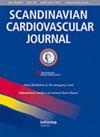Quality of life following renal sympathetic denervation in treatment-resistant hypertensive patients: a two-year follow-up study
IF 1
4区 医学
Q3 CARDIAC & CARDIOVASCULAR SYSTEMS
引用次数: 1
Abstract
Abstract Objective. Hypertension is a significant health burden. In the last 10 years, renal sympathetic denervation has been tested as a potential treatment option for a select group of patients with treatment-resistant hypertension. The aim of this study was to broadly assess the quality of life in patients undergoing renal sympathetic denervation with two years’ follow-up. Materials and methods. Patients with treatment-resistant hypertension being treated by hypertension specialists were eligible for inclusion in this study. Bilateral renal sympathetic denervation was performed with the Symplicity Catheter System. Quality of life was measured using standardised questionnaires (Short Form 36, 15 D and a single-item question) and an open question before denervation, after six months and after two years. Results. A total of 23 patients were included. The typical participant was male, 53 years, had a mean office blood pressure of 162/108 mmHg, body mass index of 32 kg/m2, and was prescribed 4.8 blood pressure lowering drug classes. At baseline, both physical and mental aspects of quality of life were affected negatively by the treatment-resistant hypertension. Over time, there were modest improvements in quality of life. The largest improvements were seen at six months. Simultaneously, the mean number of blood pressure lowering drug classes was reduced to 4.2. Conclusion. Following renal sympathetic denervation treatment, some aspects of health related quality of life showed an improved trend during follow-up. The observed improvement may reflect the impact of a reduced number of blood pressure lowering drug classes. Clinical Trial Number registered: NCT01630928肾交感神经去神经支配治疗难治性高血压患者的生活质量:一项为期两年的随访研究
摘要目标。高血压是一种严重的健康负担。在过去的10年里,肾交感神经去神经支配已被测试为一种潜在的治疗选择,适用于一组选择性的难治性高血压患者。本研究的目的是通过两年的随访,广泛评估接受肾交感神经去神经术的患者的生活质量。材料和方法。由高血压专家治疗的难治性高血压患者有资格纳入本研究。采用Symplicity导管系统对双侧肾交感神经进行去神经支配。使用标准化问卷(简表36,15 D和一个单项问题)和去神经支配前、六个月后和两年后的一个开放性问题。后果共纳入23名患者。典型的参与者是男性,53岁 年,平均办公室血压为162/108 mmHg,体重指数32 并且被开具4.8个降压药物类别。在基线时,生活质量的生理和心理方面都受到耐治疗高血压的负面影响。随着时间的推移,生活质量略有改善。六个月时出现了最大的改善。同时,降压药物类别的平均数量减少到4.2种。结论肾交感神经去神经治疗后,在随访期间,与健康相关的生活质量的某些方面显示出改善的趋势。观察到的改善可能反映了降压药物类别数量减少的影响。注册临床试验编号:NCT01630928
本文章由计算机程序翻译,如有差异,请以英文原文为准。
求助全文
约1分钟内获得全文
求助全文
来源期刊

Scandinavian Cardiovascular Journal
医学-心血管系统
CiteScore
3.40
自引率
0.00%
发文量
56
审稿时长
6-12 weeks
期刊介绍:
The principal aim of Scandinavian Cardiovascular Journal is to promote cardiovascular research that crosses the borders between disciplines. The journal is a forum for the entire field of cardiovascular research, basic and clinical including:
• Cardiology - Interventional and non-invasive
• Cardiovascular epidemiology
• Cardiovascular anaesthesia and intensive care
• Cardiovascular surgery
• Cardiovascular radiology
• Clinical physiology
• Transplantation of thoracic organs
 求助内容:
求助内容: 应助结果提醒方式:
应助结果提醒方式:


